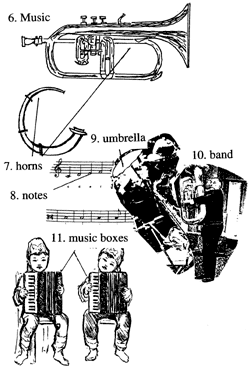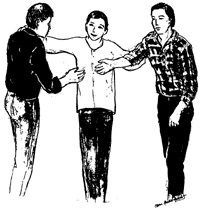Unit 21: Comparison
Pictured Words

| 1. ice
|
| 2. bird
|
| 3. wing
|
| 4. ant
|
| 5. angle
|

| 6. music
|
| 7. horns
|
| 8. notes
|
| 9. umbrella
|
| 10. band
|
| 11. music boxes
|

| 12. moon and stars
|
| 13. stones
|
Adjectives
Structure Words
Sayings
That band makes better music than the boys with their music boxes.
You must give much attention to the notes if you would wish to be better.
They are only making more noise.
At full moon its size is much greater.
The number of ants is greater at full moon.
There is only a small number of birds that are adjusted to walking on ice.
Ice is formed when water gets a bit colder all the time.
A square has four angles, not more than four.
Comparison
You have now seen many examples of the way words take different forms when in groups.
The basic form that is in your New Words is given the name: the root form.
As you have already seen, the root may be changed by the addition of such parts as -ing, -er, or -un, as may be needed in the group of which it is a part.
The important point to have in mind is that words on their own do not have as much use as when they are in groups.
It is a common condition of all languages that any group of words must be in the form which gives the right sense.
That is to say, the group has a special structure and each word in it takes the form that has the right connection with that structure.
We give that structure the special name: grammar.
That is the way things are in your own language just as much as in English.
So, do not give all your attention to the learning of the words.
It is very important to get a knowledge of the part they play in the structure of the groups in which you find them.
Hearing and reading are the best way to do this, and that is the reason for the frequent use of stories and additional reading in this course.
Quite frequently, it is necessary to make comparisons of one thing with another.
This is made easier by using special forms of a word within the group.
They are given the name: "the comparative form".
They may give the sense of quality, size, amount or form, and so on.
For example, "much" is a measure of amount.
When it is greater we say "more".
When it is greatest we say "most":
where it had not much earth .
some sixty, some thirty times as much .
more value than a flock of sparrows .
to him will be given, and he will have more.
where most of his works of power were done.
In the same way, "little" is a measure of smallness.
When the amount is smaller we say "less" , when it is smallest we say "least":
small need of forgiveness gives little love.
training of the body is of profit for a little.
am I to be loved the less?
the less gets his blessing from the greater.
he who is least in the kingdom of heaven .
you did it to the least of these my brothers.
A further example of comparison is "good", which is a measure of quality of nature.
Its comparative form is "better" and its superlative "best".
make the tree good.
so that they may see your good works.
it will be better for the land of Sodom.
pointing you to an even better way if I ever said to the best gold, I have put my faith in you .
And the opposite of good is bad, with the corresponding forms "worse" and "worst".
the weather will be bad today.
a bad tree will not give good fruit.
the last error will be worse than the first.
for fear a worse thing comes to you .
the worst in the land of Egypt.
These are all irregular forms of the root words.
The frequency of the use of such forms is great.
So, you do not have to get to know rules about them.
You will soon be able to say them rightly because they are used so often.
You only need to get the idea that words often change in statements that compare things like qualities, sizes and shapes.
It is also possible for "more" and "most" or "less" and "least" to be used with adjectives to give degrees of comparison.
The idea of "more" may also be given to an adjective by adding -er.(the comparative form).
The idea of "most" may be given by adding -est (the superlative form).
For example, "great" becomes "greater" (comparative) or "greatest" (superlative).
he who is least in the kingdom of heaven is greater than he.
A greater thing than the temple is here .
a greater than Jonah is here.
greatest in the kingdom of heaven .
about who was the greatest .
the greatest of these is love.
However, this cannot be done with "less" and "least".

A Peace Maker
And seeing great masses of people he went up into the mountain; and when he was seated his disciples came to him.
And with these words he gave them teaching, saying,
Happy are the poor in spirit: for the kingdom of heaven is theirs.
Happy are those who are sad: for they will be comforted.
Happy are the gentle: for the earth will be their heritage.
Happy are those whose heart's desire is for righteousness: for they will have their desire.
Happy are those who have mercy: for they will be given mercy.
Happy are the clean in heart: for they will see God.
Happy are the peacemakers: for they will be named sons of God.
Happy are those who are attacked on account of righteousness: for the kingdom of heaven will be theirs.
Happy are you when men give you a bad name, and are cruel to you, and say all evil things against you falsely, because of me.
Be glad and full of joy for great is your reward in heaven: for so were the prophets attacked who were before you.
You are the salt of the earth; but if its taste goes from the salt, how will you make it salt again?
it is then good for nothing but to be put out and crushed under foot by men.
You are the light of the world.
A town put on a hill may be seen by all.
And a burning light is not put under a vessel, but on its table; so that its rays may be shining on all who are in the house.
Even so let your light be shining before men, so that they may see your good works and give glory to your Father in heaven.
Additional Reading
Goodness is an advertisement for God.
It lets other persons see the better qualities of living.
As a result they give glory to their father in heaven.
And goodness has a number of forms.
Some of them are listed in the statement, "A Peace maker".
It is said that Gandhi, respected leader of the attempt to be free in India, went to an important meeting of young men and women in that country.
He was requested to give a special talk to them.
They were rewarded with our statement, "The Peace Makers".
He took out a copy and read only those words.
Then he took his seat and said "Do this and all will be well".
The words "Happy are the peacemakers, for they will be named the sons of God" are a much needed observation in our society today.
We do have a great need of peace.
Mankind has such fearful military might under its control that self destruction is quite probable.
It is most important and very necessary that peace be man's chief purpose.
One might say, peace at any price is a wise observation.
But, that is not the only condition to come about from these good qualities.
Each statement has its own reward.
Such as: the kingdom of heaven, comfort given, the earth's heritage, righteousness, mercy, and seeing God.
With them all comes the possibility of hateful comparisons and even evil experiences.
But our sense of happiness at the rewards of goodness is so great as to far outweigh the bad angles.
Rome was built on seven hills.
In English there is a saying, "all roads go up to Rome".
It is a usual thing to say that we make a journey "up" to the chief town of a country.
We go "down" from it.
That is because men had to look up to Rome.
It is something the same here with "the town on a hill" and "the light put on a table" that are representative of goodness.
These are things which all men "take a look up to".
They do so naturally and they give glory to God for that attraction to good living.
We should have in mind that the persons to whom these words were said were the great masses of people that came to see what was going on up there on the hill.
They were not persons of a religious organisation, nor were they making an attempt to be good.
They were the usual sort of people that may be seen anywhere.
Yet, those words have come down to us through time and still hold a great interest for all men.
That is probably why Gandhi made use of them in his reading to the masses of young men and women in India.
It is a good thing to keep in mind the idea of salt.
In those days, salt was not only put into food to give it a good taste.
It also was there to keep it in good condition.
It kept the food from going bad.
In the same way we are to keep society from going bad.
Helpful Notes
| masses
| big numbers or amounts.
|
| teaching
| giving training in the truth.
|
| kingdom of heaven
| the harmony and happiness that comes from God.
|
| gentle
| kind and thoughtful acts.
|
| heritage
| things that come by right.
|
| falsely
| wrong, in error.
|
| salt
| a chemical substance needed for health.
|
| rays
| lines of light coming out.
|
| advertisement
| made publicly known.
|
| listed
| set out in order.
|
| observation
| something seen and noted.
|
| earth's heritage
| the right to a place in the earth.
|
| outweigh
| go beyond, pass beyond.
|
| religious organisation
| a society for religious practice.
|
| from going bad
| keep fresh
|
Interesting Facts And Records
This book of verse is the product of the best brains of early times.
The Psalms are very old.
Some say that they have in them some of the thoughts and ideas that came from Mesopotamia long before.
But, the most beautiful of the Psalms were the writings of King David.
He gave us the 23rd Psalm, well known even to this day.
The Psalms were put to music from the very first.
They are still in musical verse for singing in our churches.
The Church of Scotland has long done this.
It has given musical committees the delicate work of putting the Psalms into English musical verse.
We must have in mind that they were once in a very different form of verse.
They were songs in a kind of question and answer form.
One group of persons would give the question and the other would give the reaction upon receiving it.
They would do this in the open air in harmony with the music as it was playing.
It was a kind of open air opera in early times and only later did it take on a polished form for companies of persons in buildings.
Psalms are thus very different to prose.
Being in verse they have a physical difference because of their distinctive rhythm.
However, it is a rhythm one must become educated to.
It has been the responsibility of committees to make a careful digestion of the meaning of the Psalms so that the rhythm they now have would be a bridge between past ideas and today's religious values.
They had to be a bridge between the two.
This has not come about automatically.
Because of their religious attraction to most of us the Psalms have great personal approval.
This is probably because they were a record of different experiences in everyday life.
They are the result of a process of growth in a nation's dependence upon its God.
The Psalms thus came to have a close relation to and be in full harmony of content with man's response to his Maker.
The Psalms are more than a record of these exchanges in the past, they give us support as a religious force in every day life.